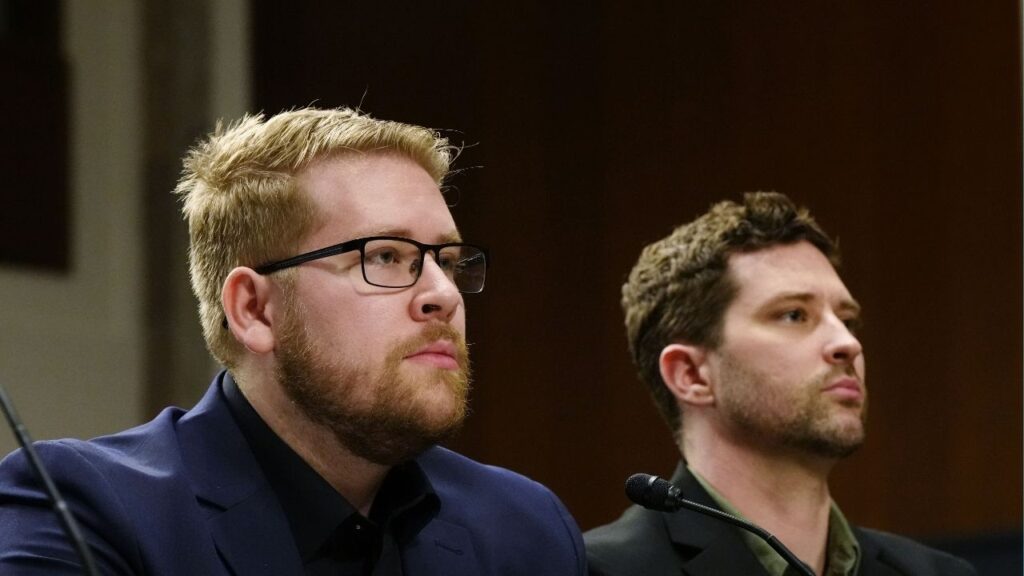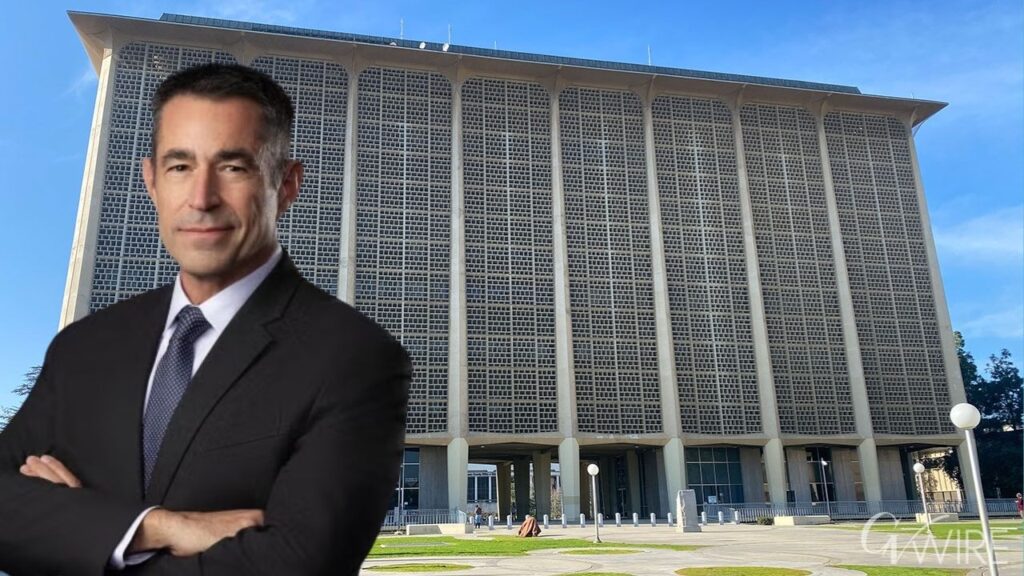Fresno trustees heard the first in a series of presentations on district efforts this year to boost student academic outcomes. (GV Wire Composite)

- Fresno Unified trustees postponed a vote on a proposed project list for the $500 million Measure H on November's ballot.
- The board learned what top-level instructional administrators are doing to support principals, especially those who are new to their jobs or have new teachers.
- The district's "intensity" areas are third-grade reading, eighth-grade math, and making sure ninth-graders are on track to graduate.
Share
|
Getting your Trinity Audio player ready...
|
The Fresno Unified School Board continued its recent trend of on-time starts for its semi-weekly board meetings, and Wednesday night’s meeting marked the start of presentations outlining what the district is going differently this year to boost student academic outcomes.
But missing from the agenda was the $500 million Measure H project list, which Board President Susan Wittrup announced at the start of the meeting had been pulled.
District spokeswoman Nikki Henry told GV Wire it was pulled from the agenda by staff.
According to the proposed project list, the lion’s share of the $500 million would go for school improvements and upgrades in four trustee regions: McLane, Roosevelt, Fresno High, and Edison. The board had decided this year to consider projects through an “equity lens,” targeting schools with the most need no matter what region they are in.
Related Story: Will Fresno’s $500M School Bond Projects List Excite Voters in a ...
The board has yet to finalize the list, and the next scheduled board meeting is Oct. 9 — two days after the Fresno County Elections Office mails out ballots to voters and in-person voting begins at the downtown Fresno elections office.
Focus on Student Outcomes
Wednesday’s meeting included the first in a series of presentations on what the district is doing new this year to achieve Interim Superintendent Misty Her’s two goals of improving student academic outcomes by 15 percentage points on standardized testing each year in the next two years and improving customer service.
Watch: Highlights from FUSD Student Outcomes Presentation
Her gave the board a schedule of presentations, which will include the results of internal testing after the first academic quarter at the Oct. 23 meeting, followed by similar presentations on assessments at the Dec. 18, Feb. 26, and May 21 board meetings.
She has previously pledged transparency in how the students are faring on assessments during the year.
Trustee Keshia Thomas asked whether the student data that was part of Wednesday’s presentation was an example or real data. Her responded that the real data will be presented after student testing at the end of each quarter.
The presentation included the district’s “intensity areas” of focusing on third-grade reading, eighth-grade math, and keeping ninth-graders on track to graduate and go on to college and career.
Although the district’s literacy goal is for all students to be reading at grade level by first grade, it’s putting a special emphasis this year on third-grade literacy, which is critical as students shift from learning to read to reading to learn.
Eighth grade math is an intensity area this year because of the struggles that many students have with high school algebra, Her said.
“The reason why it’s eighth grade math is because eighth grade math is the gatekeeper that goes into algebra. And algebra is when we lose a lot of our students. If they don’t get the fundamentals down for eighth grade math, then that’s when we start to see that we’re losing a lot of our students,” she said.
The third intensity area is making sure ninth-graders are on track for graduation, because historically that’s the year when most students drop out, Her said previously.
Supporting Principals Is Key to Student Success
Wednesday’s presentation was from the so-called “executive level” and outlined how instructional superintendents are focusing a lot of attention on school principals to make sure they have the support that they need so they can properly support and guide their school staffs.
Far and away, the biggest impact by principals on student incomes is when principals participate in teacher learning and development, said Dr. Natasha Baker, the district’s chief academic officer.
Principal supervisors are out at schools, working with principals, observing professional learning community meetings where student outcomes are discussed and strategies are developed, and providing support as needed, said Dr. Marie Williams, the district’s instructional superintendent.
“Today, a principal called and said, ‘I have NTAs (nonteaching assistants) out and I need support at lunch time.’ OK, let’s get somebody over there. Right. So we really are all about providing service to sites, but really prioritizing teaching and learning,” Williams said.
That on-site oversight includes visits at least once monthly to every school site, and more often if the principal is new, the teaching staff is predominantly new, or extra visits are warranted by assessment results or school culture, she said.
“We have noted that we have sites that have higher proportions of brand-new teachers,” she said. “And so we want to make sure in collaboration with our assistant superintendent partners, that we are putting special focus and attention at those sites in terms of professional learning, in terms of observation and feedback, help with evaluations, whatever folks need.”
Too Many New Teachers at Some Schools a Concern
Trustee Elizabeth Jonasson Rosas said she has long been concerned that some schools seem to consistently have higher concentrations of new teachers, which can impact student learning and school culture.
“I really think we need to address that. It’s something that affects some of our school sites quite a bit and consistently and I know has implications for student achievement,” she said. “So how do we make sure that we don’t have certain sites with consistent concentration of new teachers? So I’d love to see how we’re addressing that.”
Teacher assignment is typically a result of seniority in Fresno Unified.
Trustee Andy Levine said he hoped the district would work harder to engage parents and community members in the upcoming discussions and presentations on the work that is underway to boost student achievement, which includes addressing chronic absenteeism and suspensions.
“I love the fact that we’re doing a different topic and different focus area each board meeting within this. And so it feels like it presents an opportunity to really advertise to the community that this is what we’re talking about at this board meeting,” he said. ” … We should really advertise to our parents that this is what we’re talking about tonight, if you want to be a part of the conversation and learn about the work that’s happening. But also a good idea is to almost treat it as like we’ve got a board workshop every other week now. So really just making sure it’s clear we’re not just doing a generic board meeting every week anymore.”
RELATED TOPICS:
Categories

Renee Good’s Relatives Speak to Lawmakers in Washington

















